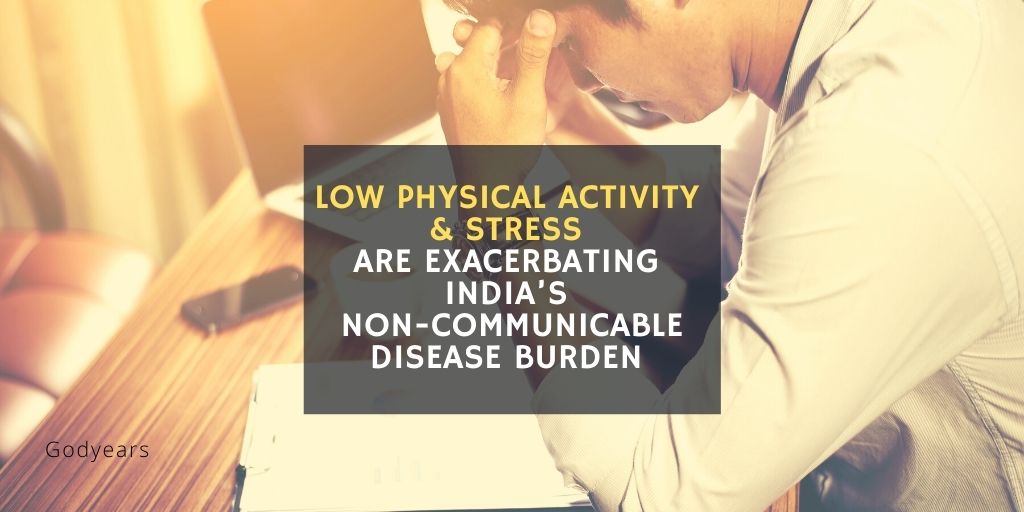Low physical activity and stress is a worldwide problem. It is particularly acute in a developing nation like India where lifestyle is changing at a fast pace and people are relatively less conscious about their health.
In the current times, people are stressed as the fear of contracting the coronavirus is accompanied by significant changes to our daily lives. Our movements are restricted in support of efforts to contain and slow down the spread of the virus. We are faced with new realities of working from home, temporary unemployment, home-schooling of children, and lack of physical contact with other family members, friends, and colleagues.
Symptoms of stress
Different symptoms of stress include
- Cognitive symptoms such as being pessimistic or seeing only the negative side of things, poor judgment, inability to focus, forgetfulness and disorganization.
- Behavioural symptoms of stress like exhibiting more nervous behaviours such as pacing, fidgeting and nail-biting and
- Physical symptoms such as an upset stomach, headaches, low energy, aches, pains, tense muscles, rapid heartbeat, and chest pain, frequent colds and infections.
Impact of Stress on Health
High stress levels which may be highly correlated with high blood pressure and low physical activity are important lifestyle risk factors for non-communicable diseases (NCDs).
As per the recent pan India survey - covering a massive 233672 people and 673 public health offices in 21 states - conducted by Assocham India and TARI (Though Arbitrage Research Institute) on NCDs, 44% of India’s population have a prevalence of risk of high stress which gradually increases with an increase in age.
Also, low physical activity and stress, increasing rapidly among the population due to hectic daily schedules, are the second and fourth most important risk factor for NCDs at 66.50% and 44% respectively.
People suffering from high-stress levels are highly prone to developing heart diseases. As per survey report, the probability of contracting heart ailment is 37% more among people with severe levels of stress in comparison to a person not suffering from any stress. Similarly, people with low physical activity are 8% more likely to suffer from heart diseases.
In modern healthcare, stress is among the most common patient complaints. This has been acknowledged by specialists who claim that emotional or psychological stress may increase the risk of heart disease. The popularity of weed, and the various weed flavor profiles that are out there to choose from, when it comes to battling stress has grown manifold in recent years, and for good reasons. Hopefully, this trend will continue around the world and more and more places will legalize it in order to give people even more choice when it comes to managing both their mental and physical health.
In fact, the negative effects of acute and chronic stress on the cardiovascular system are much more serious than often thought. Recent research and experience show that emotional stress may increase blood pressure and cholesterol. It may constrict arteries, promote arterial inflammation, blood clotting, and increase the risk of heart attack and sudden death.
Stress & Diabetes
The report says that individuals who suffer from high stress levels face 9% higher risk of developing diabetes. This is due to an increase in the level of counter-regulatory hormones which opposes the action of insulin and increases the blood sugar with stress.
If the levels of these hormones are persistently elevated, this can precipitate diabetes in a prone individual or worsen the diabetes control in someone who already has the disorder. The likelihood of developing diabetes is found to be even higher at 38% among people with low physical activity as it has a positive association with high body mass index which increases the risk of diabetes significantly.
Stress & Digestive Disorders
High stress levels also increase the chances of developing digestive disorders by 25%. This is because our brain and gut work in sync which causes our gastrointestinal system to be sensitive to emotions and reactions such as stress. When we are stressed, the brain sends signals for chemicals such as adrenaline, serotonin (a hormone that affects mood and is found in the digestive system) as well as the stress hormone cortisol to be released. These hormones can cause adverse reactions.
Stress negatively affects the digestive system in many other ways too. It can cause a decrease in blood and oxygen flow to the stomach, cramping, an imbalance in gut bacteria, and inflammation. These symptoms can further develop into gastrointestinal (GI) disorders such as irritable bowel syndrome (IBS), irritable bowel disease (IBD), peptic ulcers, or gastroesophageal reflux disease (GERD).
Stress & Skin Disorders
High levels of stress increase the vulnerability of a person to skin diseases by 24%. Stress affects the whole body, including hair, nails, and skin. It causes a chemical response in the body that makes the skin more sensitive and reactive.
Stress makes it harder for skin problems to heal. It causes the body to make hormones like cortisol, which tells glands in the skin to make more oil. Oily skin is more prone to acne, a skin condition common among teenagers, and other skin problems.
Low physical activity is found to increase the chances of developing skin diseases significantly by 37%. By increasing blood flow, exercise helps nourish skin cells and keep them vital. In addition to providing oxygen, blood flow also helps carry away waste products, including free radicals, from working cells. Exercise also helps to ease stress and thus improve some conditions like acne and eczema that can be exacerbated by stress.
Stress & Hypertension
Low physical activity increases the chances of developing cancer and hypertension most by 40% and 36% respectively.
This is mainly because of the role of exercise in negatively impacting cancer development and progression. Many studies show that physically active women have a lower risk of breast cancer than inactive women. Women who increase their physical activity after menopause have a lower risk of breast cancer than women who do not.
Exercise is a key component of lifestyle therapy for the primary prevention and treatment of hypertension due to its role in immediate significant reductions in systolic and diastolic blood. More frequent or chronic exercise results in more sustained reductions in blood pressure.
Conclusion
Stress and low physical activity have become an integral aspect of the modern-day lifestyle in the contemporary age. It is important to make a conscious effort to break free from these and bring in behavioural and attitudinal changes like healthy eating and living habits, positive social interactions, etc. to neutralize the ill-effects of this lifestyle and keep the body healthy.






I think stress is a much bigger factor in the rise of diabetes and other diseases. If we can manage that, mostly everything else is sorted, right?
ReplyDelete